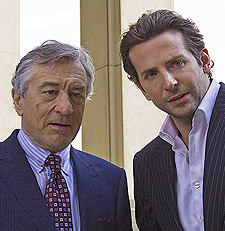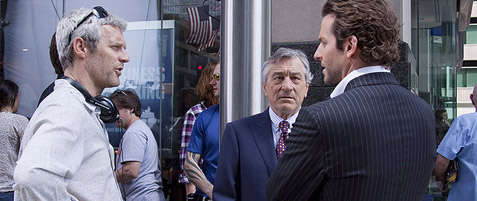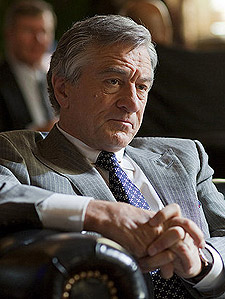
Interview Date: 03/09/2011
Run Date: 03/16/2011
Interviews Home / Movies Home / Bullz-Eye Home
Even when he's not the center of attention, it's hard not to concentrate on Robert De Niro when he's in the room. At a recent press conference for "Limitless," Neil Burger's new film about a downtrodden writer given a drug that unlocks the full potential of his brain, you could see rows of journalists staring at the actor, trying to divine even the smallest shred of insight from a raised eyebrow or scratch of the cheek.
But today, De Niro was a good soldier, here to talk about his role as Carl Van Loon alongside Burger and screenwriter Leslie Dixon. The trio offered up numerous musings on the film, the creative process and one big, existential question.Neil Burger: "Limitless" is kind of a crazy story about a guy on a smart drug. It started from a book called “The Dark Fields” by Alan Glynn. And then Leslie found it and made it into a fantastic screenplay. Which, don’t say this to Alan, but I think is better than the book. And actually, what struck me about it when I first read it, it’s actually more of a true depiction of power in New York and intelligence and the way the characters were depicted. The book is great and the way Leslie did the screenplay was even better.
Leslie Dixon: I wanted the book for pleasure. I was so burnt out reading bad thrillers and galleries that studios wanted us to turn into movies. And I went into the Green Apple book store in San Francisco and asked the geeks who work there, because they’ve read everything, what could I read that won’t suck? It doesn’t have to be at the highest intellectual point, but it should have some substance and it shouldn’t be an end rule to turning pages. And they said "Oh, we’ve got it, we’ve got it; this is the bomb." And they gave me “The Dark Fields.” And I was not looking for a job or an adaptation; I just wanted to read a book. But I got about half way through and sat up in bed and went, "This is mine. I’m going to bring this to a movie." And there were pinwheels in my eyes. I was quickly brought down to earth because Harvey Weinstein owned the rights. It was a little too good of a premise. I wasn’t the first person who had noticed that perhaps it had some commercial potential. And so that is another story. I don’t want to suck up the oxygen in this air telling you, but I snaked him out of the rights to the book. Even though I admire him very much, I did not want to make the film at Miramax, which was at the time imploding. So I ended up snaking him out of the rights, and writing the script and getting it set up and getting Neil. And the bulk kind of rolled from there. I got a little help from Niccolò Machiavelli in how we did it, but if anyone wants that story they can have it later. It was the most evil thing I’ve ever done.
NB: Once we had the ball rolling and once Bradley was involved, we needed a very powerful character to play Carl Van Loon. If Bradley Cooper’s on this smart drug, we needed somebody who was powerful just in their own right. So all of us thought, Leslie and Scott Kroopf, who’s the other producer, who better than Robert De Niro to be that guy. If Bradley's character was taking a shortcut as it were, by taking this drug, this was somebody who had put in the hard work; put in the time; paid his dues and was just sort of strong and powerful in his own. We needed somebody who just embodied that from the get go. You took one look at him and you were impressed, intimidated; you understood where he was coming from. And so we were lucky enough to have Bob.
Journalist #1: For Mr. De Niro, Bradley just did five minutes talking about his admiration for you since a kid, his first meeting you, meeting you to do this movie. And I wonder, with your reputation, how is the intimidation factor when you meet young actors. Do you have to do something to sort of try to put them at ease or make jokes?
 Robert De Niro: That goes away in a couple of days, if not sooner. I mean you have to work. In fact, any of that kind of stuff you should use; an actor will use it, should use it, in the interaction.
Robert De Niro: That goes away in a couple of days, if not sooner. I mean you have to work. In fact, any of that kind of stuff you should use; an actor will use it, should use it, in the interaction.
J1: Especially if the character you’re playing would be intimidating.
RD: Well yeah, exactly. Hopefully you use anything that you can that will work.
J2: Do you think you’ll work with Scorsese again?
RD: Yeah, I’m planning on it. Absolutely.
J2: In what?
RD: Well this time I’ll say it, it’s a movie based on a book called “I Heard You Paint Houses.” It’s about a guy who is, and I believe the book says he’s now passed away, but he confessed that he killed Hoffa. And also Joe Gallo over here on Hester street. So I’m going to play that character. Joe Pesci’s going to be in it and Al Pacino going to be in it and Marty’s going to direct it.
J2: And it’s going to happen for sure?
RD: We’re really working towards making it happen. I’d never say it if I didn’t fully have us all committed and stuff.
J3: My question is for Leslie. Why doesn’t Van Loon, at the end when he discovers the drug, why did you choose that he does not take it?
LD: Well he’s had some experience seeing what happens to you when you stop. I think anyone who knows even the smallest bit about it knows that at no point in the movie is it clear that it has been perfected, to a point where there might not be some whooping side effect waiting for you around a corner. Van Loon is older than Eddie. Look what happened to Hank Atwood. I wouldn’t take it if I were Van Loon. I’d try to copy someone who did. I tried to make the choice that I would really make if I was Van Loon.
J4: My question is for the director. Are you concerned or excited or worried that some people might think the message of “Limitless” is take drugs, get to be the president?
NB: That’s the slogan on our poster, isn’t it? Actually, we almost came up with a marketing campaign where we had people like Michael Jordan or Barack Obama saying "Powered by NZT" or something like that. But we didn’t do that. It’s a cautionary tale in a way. Obviously there’s horrible side effects to the drugs; people want to kill you to get it. So there’s two edges to it. He has this wonderful kind of wish fulfillment, having these adventures and having these romances and things like that based on the drug. But there’s a real downside to it. To me, it’s less about the drug and more about power, and this guy trying to empower himself. There’s always that danger. But you could do that in a movie about smoking where the first third is somebody glamorously smoking in a nightclub, holding a cigarette and the last two thirds they are just rotting from lung cancer. And still people would come away wanting to look like those people smoking cigarettes. So there’s always a danger of that.
J4: It would be like you beat the system, but you can figure out why he can’t stop.
NB: Yeah, there’s that possibility, but we are sort of following the kind of narrative dictates of the story, rather than just creating a morality tale, even though it has that aspect to it as well.
J5: Why do you think the smartest person would seek power, instead of trying to get as much liberated from it as possible?
Leslie Dixon: I always imagined that Eddie would go through some levels of thinking. And obviously your first instinct as a human, because he’s still a human even if he’s on the exalted drug, is to get everything that we possibly can. Fortify yourself financially, socially, in every way. I would like to think that he would evolve past that at a certain point. The movie’s not long enough to show that evolution. But at a certain point, you get the sense that whatever he’s doing isn’t quite enough, and there’s always something he’s reaching for beyond that. It could easily go to a spiritual place, or some other kind of place beyond what we show at the end of this movie. And I think realistically it would. But it’s just not quite as exciting as someone trying to disembowel you trying to get at a drug. So we sort of stopped the tale at the moment that we did. But that is not to imply that’s all Eddie will ever do, or he won’t evolve past feeling those feelings because I think anyone who is a restless, driven person is always on quest for what’s next and more meaning.
J6: I have two questions. Mr. Burger, in this film, you have very successfully visually realized the evolution of this character’s search for power. Could you speak a bit about your choices as to how you actually illustrated this evolution in images. And the second question is for you Mr. De Niro and it’s a very simple question. I hope you don’t mind it. What makes you happy these days?
NB: I’ll be brief because I want to know as well. So visually, I mean there are a couple of different visual languages in the movie and they’re directly related to the different states that Eddie, Bradley Cooper’s character, is going through. When he’s regular Eddie, you know, it’s one thing. And when he’s on the drug, it’s another. And when he’s off the drug it’s even a different thing because when he’s been on it, it’s worse than when he’s just regular Eddie. New York is harsh and grim when nothing’s going well when he’s regular Eddie. And so that dictated a certain look. And then when he’s on the drug, that was another thing. How do we make that be kind of luminous and clear, and just sort of as brilliant as he is?

And then the other thing visually was just how do you represent his perception of the world when he’s on it, and how he processes information. And I wanted to do it in sort of a non-digital way. I wanted to do it not in kind of the typical CGI, but almost in a more organic way. I wanted kind of an emotional connection to the effects. So some of them are kind of primitive. It’s not like we’re necessarily inventing new ground. When he’s cleaning up his apartment or something like that, you’ve seen that before, but it was very much a representation of how he was everywhere at once in his own mind. There was a 360 degree panoramic effect like he was omniscient for a moment. And then with those infinity zooms it was really how he saw himself moving through the city and moving through the world. And those are inspired by Escher drawings and fractals and fractal zooms. And just trying to see how he saw the world in sort of like these microcosm and macrocosm all kind of working together; sort of mirrored holes and moving through the world.
You know that bullet time from “The Matrix”? If it hadn’t been invented yet it would have been perfect for our movie but now you see it in every kind of TV commercial for the local TV news or something like. So I just didn’t want to do any of that. I wanted to do something new and that was representative of his state of mind. What makes you happy, Bob?RD: Oh god, you didn’t give me enough time to think about it. I can’t answer that question. I have a lot of things that make me happy; some don’t. I have ups and downs. I have children, I have family, I have a lot of things. So you know, one day I’m happy with some parts of it, other days I’m not. It’s okay. I can’t really complain.
J6: In so many ways, without the use of NZT, you’ve accomplished what this character does. I mean you’ve done so much, you’ve got connections to so many different things. I’m just wondering what’s the most…
RD: Well some of them make me happy at the moment, and then when they’re not going so well, you’re not happy until they go well. You know you gain a little, get to a level with it or whatever. But yeah, NZT would probably be something that once in awhile I wouldn’t mind trying. But not getting hooked on it.
NB: That’s what they all say.
RD: That’s what they all say. Exactly.
J7: My first question is for Leslie, my second for Mr. Burger. I love the remark in the film "It works best on smart people." Define smart. And was it your idea and what’s behind there?
LD: It’s actually one of the very few lines from the book. And I kept it because I felt of course, it’s exponential, right? It gets larger and larger depending on what kind of synapses you have in the first place. The faster they go anyway, you’re off to the races. I always felt Eddie was an underachiever. There was intelligence there, just zero motivation. So what NZT did for him, in addition to make the synapses fire more quickly, was getting the motivation to do something. But I’m sorry to say I can’t take credit for that.
J7: Mr. Burger, this is about the structure of this movie. How difficult is it to keep balance with interesting dialogue and action? You have the right amount of each. You get almost the perfect structure, if you haven’t noticed.
NB: Well the movie has an unusual structure, which I think it benefits from because it always keeps you guessing. In a way it’s very front loaded with the visuals. And then once the Van Loon character comes into it things, and once Eddie goes through his sort of lost night of time skipping, it kind of changes. And Eddie, when he decides that he’s just going to stay on NZT, he sort of becomes an assassin in a way. You know, that’s kind of the way we considered it. So it was all really structured based on the evolution of his character, going from regular to then when he was on it, it was almost joyful for him. It was such bliss for him to have everything come so easily. And then he has the horrible side effects. And then he decides he doesn’t care and he’s just going to go for it anyway. So he was on NZT, he was great, but there’s something kind of almost inhuman about him at that point, until the very end.
J7: So that was easier for you with your structure?
NB: Well it was a concern and a challenge to make it work and make it play because it’s unusual. And then punctuating it with those visual episodes.
J8: Mr. De Niro, your character doesn’t seem like a particularly challenging role. What can you say to that?
 RD: It’s not that it’s not challenging; it is. I enjoyed doing it. You know, I wanted to work with Bradley and Neil. I liked one of Neil’s other films. So sometimes, even though it’s not perfect, you do it to work with people; so you can work with them again, later on. You establish a relationship. And to me it was well worth it. It was well written. Leslie did a very good job. It was good for me and I put a lot of work into it.
RD: It’s not that it’s not challenging; it is. I enjoyed doing it. You know, I wanted to work with Bradley and Neil. I liked one of Neil’s other films. So sometimes, even though it’s not perfect, you do it to work with people; so you can work with them again, later on. You establish a relationship. And to me it was well worth it. It was well written. Leslie did a very good job. It was good for me and I put a lot of work into it.
J9: Was it better than “Fockers”?
RD: Well that’s a whole other thing. That’s a whole other animal if you will. And also I don’t have to carry the movie. And that’s okay.
J9: Well how would you rate this character? I mean you’ve played corrupt before. You’ve played powerful before. How would you compare him to say other iconic characters that you’ve had, that are kind of in that vein but you had a twist on it this time?
RD: He is Van Loon. He’s different than the other characters I’ve played. He’s a legitimate businessman, or as legitimate as whatever. I mean I’m sure he’s done things that are not so savory as he sort of says and intimates.
J9: He’s not Al Capone.
RD: No, not at all.
J10: Can we get your snaky tale?
LD: Anybody who wants it, sure. I wanted to write the script with no executive interference. I had a vision. I wanted to do it. I didn’t want to have meetings. I didn’t want to have layers of notes. I didn’t want to be told it had to be PG-rated. I just wanted to write it as if it was this way. So that meant getting it out there. So it was lying around and they weren’t doing anything with it. And I wrote Harvey a ballsy, profane email which I thought would get his attention. And I said "Listen, you hardly know me but I’ve written a bunch of movies. I will write this script for you, virtually for free." Actually I used the phrase "This will get you in your Hasidic scrotum." I really was trying to be funny because I had no chance of getting his attention and he is the type of guy that says that sort of stuff that’s hilarious. It was never done to offend him; I had every intention to just play with him. Because I really do respect the guy. But I knew the company was going to go under and I needed to get it out of there. So I said I’ll write the script for free, with no executive interference of any kind. And I’ll give it to you and if you like it you can make it. And if you don’t like it, I get the rights. And you have a certain amount of time to respond to this.
But that was where the sneaky part came in. I was walking around a church in Italy and I put my hand on the tomb of Niccolò Machiavelli and said "Okay, what would you do?" And I don’t know if this had anything to do with what happened, but then came this idea that I should put a very short time trigger on how long they had between the time they read the script and the time I got the rights back. Well I turned it in during Cannes. I waited until every executive was on a plane. And they didn’t care about this anyway and I was doing it for free. They had sort of lost faith and they weren’t paying that much attention. They’re all off in Cannes, buying movies, looking at movies. They had forgotten all about me. No one read it. I’m serious. No one read it. Ding! Meter went up, I got the rights. Later they did read it and say oh you know, we like this. Tough. And that’s how I got it.
You can follow us on Twitter and Facebook for content updates. Also, sign up for our email list for weekly updates and check us out on Google+ as well.











